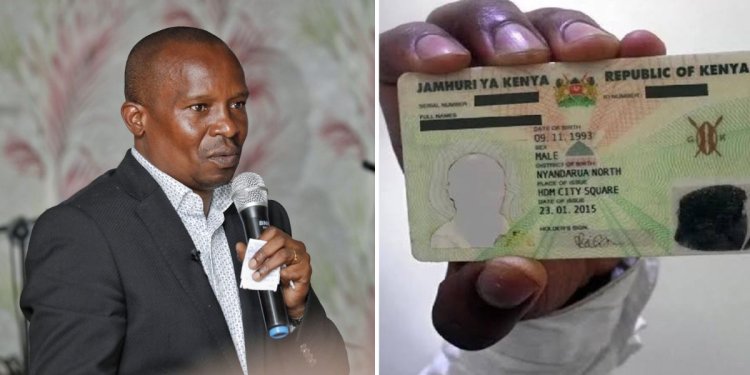Eye, Fingerprint, Facial Recognition: Kindiki Explains Features Of Electronic ID
According to Kindiki, the new features would supplement the fingerprint security feature which is contained in the current IDs.

Interior Cabinet Secretary Kithure Kindiki, on Wednesday, May 24, gave more context on the upgrade of the National Identification Card (ID) system by incorporating more biometric features that include facial recognition.
Speaking during the ID4Africa Conference at the Kenya College of Insurance, South C, Nairobi, Prof Kindiki revealed that the upgraded ID cards will introduce more advanced security features to deal with emerging challenges.
According to Kindiki, the new features would supplement the fingerprint security feature which is contained in the current IDs.

Interior CS Kithure Kindiki appearing before the National Assembly on April 12, 2023. /FACEBOOK.KITHURE KINDIKI
"We have an ID system which is semi-automated part of it. Going forward we are looking at upgrading our current automated fingerprint identification System (AFIS) into an automated biometric identification system which goes beyond the fingerprint and involves the iris, fingerprints as well as facial recognition," Kindiki stated.
In what might be akin to the Huduma Namba project which failed under former President Uhuru Kenyatta, the new generation IDs will have a machine-readable chip and Quick Response (QR) code and allow web-based authentication.
Besides upgrading the new features, Kindiki revealed that the newborns would be the first beneficiaries of the programme to digitise all government services.
The IDs will carry significance to all holders and would serve as a lifetime registration number.
"Going forward, we are moving towards an electronic ID with a machine-readable chip and QR code, and eventually, this should lead us to a digital ID system which will allow web-based ID authentication and, in the long run, transit all that into a unique personal identifier which we are going to give all newborns in Kenya, and it becomes the age of 18," Kindiki explained.
During the same event, the Principal Secretary of the Immigration Department, Julius Bitok, revealed that the government was targeting to launch the new IDs on September 16, 2023.
"As we reflect on (Unique Personal Identifier) UPI, we are very keen to identify September 16th as the day the government will be able to roll out some of the activities to support the UPI, which will be the foundation for our smart identity," Bitok stated.
Bitok further insisted that the government would consolidate and digitise existing databases under its custody and promote pay-to-access use by telecommunication firms and other businesses that rely on Know-Your-Customer (KYC) profiles to diversify revenue streams and minimise crime linked to identity theft.
While appearing before the National Assembly on Wednesday, April 12, Kindiki indicated that there was a consideration by the Cabinet to rework the Universal Personal Identifier (UPI).
Under the new UPI system, a child who is born in Kenya will be assigned a UPI which they are allowed to use in school and anywhere else that is required, which manifests into their ID number once they turn 18 years old.
There will also be a UPI system that will accommodate adults who are seeking IDs upon attaining the minimum age of 18.
At the same time, Kindiki hinted at the migration of the current ID system into a new generation ID for adults, which will aim to solve the glaring issues that were abandoned when the Huduma Namba project was in place.
"In the meantime, we are migrating, we are considering subject to approval by Cabinet, migrating the current ID we have into a fourth-generation ID, which is the UPI for adults, which will take away the question of Huduma Namba which was not solving the kind of problems we intend to solve," he added.
President William Ruto on Thursday, January 27 ordered ICT Cabinet Secretary (CS) Eliud Owalo to oversee the creation of a digital identity (ID) similar to the Huduma Namba, by the end of this year.
Ruto had blamed Uhuru's government for the series of failures that led to the Huduma Namba project being shelved after it drew controversy.
Owalo on Tuesday, January 10 revealed that the President was keen on exploring a similar project to the Huduma Namba while unveiling its digitisation programme, arguing that digitisation was key in centralising all government services and reducing the hassle of Kenyans trooping to government offices in person to get national Identification cards (ID).
"The intention of Huduma Namba was good because it was trying to ensure that we have a digital identity that could facilitate virtual transactions between the government and the public as far as the provision of services is concerned," Owalo stated during an interview on Citizen TV.
To avoid witnessing the same pitfalls that crippled the Huduma Namba system, Owalo announced that they would embark on implementing procedures so that the digitisation programme is in line with various countries' laws.

President William Ruto poses for a photo during a past Huduma Namba registration exercise. /CITIZEN DIGITAL






